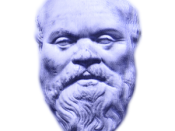MORAL PHILOSOPHY
Virtue ethics descends from the classical Hellenistic tradition represented by Plato and Aristotle, in which the cultivation of virtuous traits of character is viewed as morality's primary function. I believe that virtue ethics is a moral philosophy best suited for making business decisions. Most theories do not emphasize the agents or actors who perform actions, have motives, and follow principles. We all make judgments about good and evil persons whether it is consciously or unconsciously. I think you can tell a lot about a corporation when you look at the people within the company. Aristotle held that virtue was neither a feeling nor an innate capacity but is rather a disposition bred from an innate capacity properly trained and exercised. The virtue ethics relies on correct motivational structure.
The business world could be quite a conducive place for activating this choice to lead a life of self-improvement. After all, each of us is a participant there.
And, more and more people who participate with us in the business world are talking as if the commitment to strive toward better lives is a capital idea. (Gilbert, Daniel 1996) Virtues to be considered are integrity, courage, and compassion. I believe that we can maintain these virtues and still hold a hard-line to competition. The examples in our text regarding John Chambers, the Chairman of Cisco Systems are a great example of virtue ethics. He was a role model for all within the company. What could be a better motivator to your stakeholders than to treat them with respect and sharing the wealth? That kind of thinking motivates one to give it their best shot. It also creates loyalty and corporate identity.
There is a diner in Philadelphia that has been family owned for the past several decades. The owner was...


